-
What We Do
- WHERE WE WORK
-
About Us
 Welcome Message from Carol Jenkins
Welcome Message from Carol JenkinsFor more than 90 years, World Learning has equipped individuals and institutions to address the world’s most pressing problems. We believe that, working together with our partners, we can change this world for the better.
On my travels, I’ve had the opportunity to meet with many of those who have joined us in this mission. In Baghdad, we’ve trained more than 2,300 Iraqi youth who are already giving back at home. In London, our partners in the TAAP Initiative strongly believe that we are all responsible to practice inclusion. And in Vermont, our Experiment in International Living and School for International Training participants prove every day that they have the tools and the determination to change the world.
Please join us in our pursuit of a more peaceful and just world.
- Get Involved
Media Center > Story
A Day in the Life of a WiSci Camper
August 13, 2018
Every day is a busy — and fun — one for the campers at the 2018 Women in Science (WiSci) Girls STEAM Camp. Beyond learning how to code, build apps, and design tools to help solve problems in their communities, this group of girls are learning about leadership, women’s empowerment, and each other.
Take a peek into the daily life of our campers through the eyes of Cori, a 16-year-old from Atlanta who came to WiSci because she’s interested in studying chemistry and eventuallypursuing a career as a forensic scientist.
6:35 a.m.: Wake up!
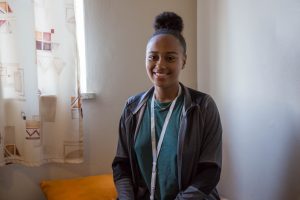
For Cori, being at WiSci — where she’s surrounded by dozens of girls from the U.S., Namibia, Kenya, Ethiopia, and eSwatini (the former Swaziland) — has not only taught her how to wait her turn for the shower. She’s also learned a lot about herself:
“I know I’m African American, but I never realized my roots. This might not be the part of Africa I’m from and I might not have met anyone from the part of Africa that I’m really from, but I never learned about Africa in history classes. For some reason they skip over that. I feel closer to myself now.”
8:00 a.m.: Breakfast
On the menu today: Weet-Bix, ham, cheese, and bread.
9:00 a.m.: Class with Girl Up 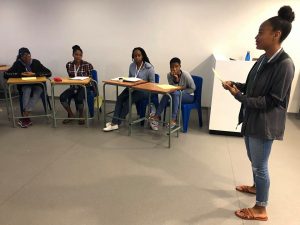
As a WiSci partner, the United Nation Foundation’s Girl Up has been leading leadership and empowerment classes each morning. Today, Cori and her classmates learned about public speaking and practiced interviews and elevator pitches.
Cori plans to start a Girl Up club when she gets back to her high school, where she says there aren’t many outlets for girls. “I learned that there’s more than one way to be a leader, that anyone can be a leader,” she says.
10:30 a.m.: Final project planning
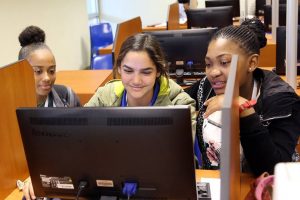
For this last week of WiSci, the campers will be working on projects using their STEAM skills to find innovative solutions to problems in their communities. Cori and her classmates Elena, Ntsikelelo, and Shakyra are devising a way to use the kinetic energy that girls in rural areas create while biking to school — sometimes several hours each way — to charge their cell phones, which can be a lifeline in their daily lives.
12 p.m.: Lunchtime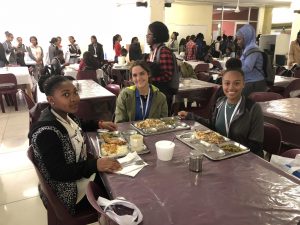
1:00 p.m.: Intel classes begin
Today, a team of trainers from Intel — a WiSci partner — kicked off their week of classes. Cori and the other campers learned coding for artificial intelligence, built CurieBots, and designed prototypes of tools that can assist in disaster scenarios from alien invasions to sharknados.
WiSci partners have been leading classes since the camp began. Last week, trainers from Google and NASA taught the girls how to build apps and use geospatial mapping tools. Even though Cori is primarily interested in chemistry, she realized that she enjoys making apps and hopes to continue trying to do so when she gets home.
3:30 p.m.: Snack break 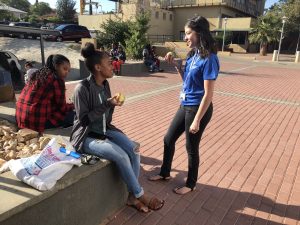
Snack choices today: apples, bananas, or cheddar popcorn.
4 p.m. Back to class 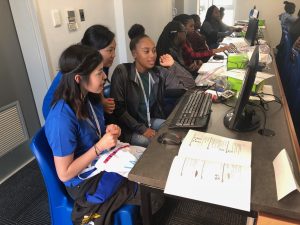
Having learned the basics of the Python programming language, Cori and her classmates began testing the Smart Animal Surveillance System — also called SASSY — that can recognize pictures of animals held in front of a webcam. Cori says she enjoyed learning from the Intel trainers:
“They’re really fun. You could tell that they’re really invested and they really enjoy this experience. It feels like they’re in it with us. It’s not just classes. They bond with us.”
6:30 p.m. Dinner
7:30 p.m. Talent show
Though there was lots of amazing dancing and singing on display, Cori’s favorite performance of the night was a public speaking demonstration from Iyambo, one of the girls from Namibia. Iyambo spoke passionately about how her fellow WiSci campers should not be afraid to pursue careers in science as they are all strong and intelligent women.
“It was really empowering,” Cori says. “You could tell she meant what she said. It spoke to me.”
10:00 p.m. Lights out!
Women in Science (WiSci) Girls STEAM (Science, Technology, Engineering, Art & Design, and Mathematics) Camp is a private public partnership (PPP) between the U.S. Department of State’s Secretary’s Office of Global Partnerships, UN Foundation’s Girl Up Initiative, Intel Corporation, and Google. In 2018, the camp will bring approximately 100 high school girls from the African continent and the U.S. together for 13 days in Namibia to explore the STEAM fields and access mentorship opportunities and leadership training.





